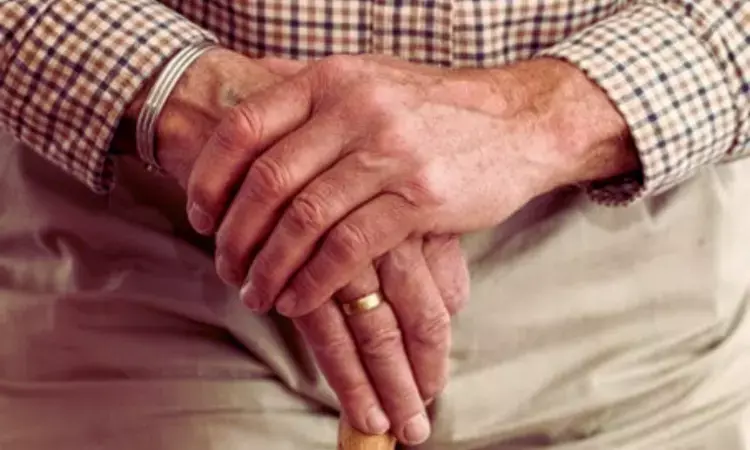- Home
- Medical news & Guidelines
- Anesthesiology
- Cardiology and CTVS
- Critical Care
- Dentistry
- Dermatology
- Diabetes and Endocrinology
- ENT
- Gastroenterology
- Medicine
- Nephrology
- Neurology
- Obstretics-Gynaecology
- Oncology
- Ophthalmology
- Orthopaedics
- Pediatrics-Neonatology
- Psychiatry
- Pulmonology
- Radiology
- Surgery
- Urology
- Laboratory Medicine
- Diet
- Nursing
- Paramedical
- Physiotherapy
- Health news
- Fact Check
- Bone Health Fact Check
- Brain Health Fact Check
- Cancer Related Fact Check
- Child Care Fact Check
- Dental and oral health fact check
- Diabetes and metabolic health fact check
- Diet and Nutrition Fact Check
- Eye and ENT Care Fact Check
- Fitness fact check
- Gut health fact check
- Heart health fact check
- Kidney health fact check
- Medical education fact check
- Men's health fact check
- Respiratory fact check
- Skin and hair care fact check
- Vaccine and Immunization fact check
- Women's health fact check
- AYUSH
- State News
- Andaman and Nicobar Islands
- Andhra Pradesh
- Arunachal Pradesh
- Assam
- Bihar
- Chandigarh
- Chattisgarh
- Dadra and Nagar Haveli
- Daman and Diu
- Delhi
- Goa
- Gujarat
- Haryana
- Himachal Pradesh
- Jammu & Kashmir
- Jharkhand
- Karnataka
- Kerala
- Ladakh
- Lakshadweep
- Madhya Pradesh
- Maharashtra
- Manipur
- Meghalaya
- Mizoram
- Nagaland
- Odisha
- Puducherry
- Punjab
- Rajasthan
- Sikkim
- Tamil Nadu
- Telangana
- Tripura
- Uttar Pradesh
- Uttrakhand
- West Bengal
- Medical Education
- Industry
Unhealthy Lifestyle, Chronic Illnesses, and Mental Health Issues Linked to Greater BPH Severity in Elderly Chinese Men: Study

China: A recent study published in Frontiers in Medicine highlights a significant relationship between the severity of lower urinary tract symptoms/benign prostatic hyperplasia (LUTS/BPH) and lifestyle choices, the presence of multiple chronic conditions, and mental health status among older Chinese men. Conducted by Yifan Wu and colleagues from the Department of Urology, Jiangnan University Medical Center, Wuxi, China, the research emphasizes the importance of a holistic approach to managing LUTS/BPH.
The study examined how various lifestyle and health-related factors affect the intensity of LUTS/BPH symptoms in elderly individuals and provided evidence-based insights for developing integrated intervention strategies. A total of 806 men aged 60 years and above, all diagnosed with LUTS/BPH, were assessed using the International Prostate Symptom Score (IPSS) and categorized into mild and moderate-to-severe groups.
Participants provided comprehensive data on demographics, clinical parameters, lifestyle habits, existing chronic diseases, and mental health conditions such as anxiety, depression, and sleep quality. A binary logistic regression model was used to evaluate how these variables influenced the severity of BPH symptoms.
The following were the key findings of the study:
- Individuals with moderate-to-severe LUTS/BPH symptoms were more likely to smoke, follow unhealthy diets, and lead sedentary lifestyles.
- They were also more commonly affected by multiple chronic illnesses and mental health issues, such as depression and poor sleep quality.
- After adjusting for factors like age, disease duration, prostate volume, PSA levels, and other lab markers, lifestyle and health variables still showed strong links to symptom severity.
- Current smoking nearly doubled the risk of severe LUTS/BPH (OR = 1.995).
- Lack of regular physical activity also nearly doubled the risk (OR = 1.996).
- Unhealthy dietary habits were significantly associated with increased symptom severity (OR = 1.590).
- The absence of heart disease was linked to a lower risk of severe symptoms (OR = 0.435).
- A normal lipid profile was associated with reduced severity (OR = 0.587).
- Not having diabetes was linked to a decreased risk (OR = 0.523).
- The absence of depressive symptoms was associated with less severe LUTS/BPH (OR = 0.447).
- Good sleep quality was also linked to a lower risk of severe symptoms (OR = 0.494).
The authors emphasized that while their study offers valuable insights, it also has limitations. It was conducted at a single urban hospital, which may limit the broader applicability of the findings. Additionally, being observational, the study does not establish direct cause-and-effect relationships. Some participants with severe psychiatric conditions were excluded to avoid confounding effects from medications like antidepressants, which can influence urinary function.
The authors concluded that the findings underscore the importance of addressing not only the physical symptoms of benign prostatic hyperplasia but also the associated lifestyle and mental health factors.
They emphasized the need for a collaborative approach involving hospitals and community-based care systems to encourage healthy behaviors, manage coexisting chronic conditions, and develop personalized treatment strategies. Additionally, they recommended conducting future multicenter studies across diverse populations to validate the results and support the development of more comprehensive and inclusive care models.
Reference:
Wu, Y., Zhang, Y., Liu, X., Huang, Y., Hua, Y., & Feng, N. (2025). Association between lifestyle, multiple chronic conditions, mental health status and the severity of lower urinary tract symptoms/benign prostatic hyperplasia in Chinese elderly. Frontiers in Medicine, 12, 1545344. https://doi.org/10.3389/fmed.2025.1545344
Dr Kamal Kant Kohli-MBBS, DTCD- a chest specialist with more than 30 years of practice and a flair for writing clinical articles, Dr Kamal Kant Kohli joined Medical Dialogues as a Chief Editor of Medical News. Besides writing articles, as an editor, he proofreads and verifies all the medical content published on Medical Dialogues including those coming from journals, studies,medical conferences,guidelines etc. Email: drkohli@medicaldialogues.in. Contact no. 011-43720751


